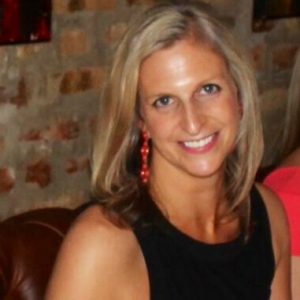Joseph Lutz
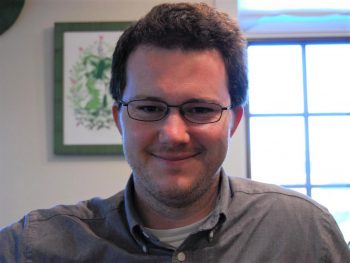
I am the Associate Director of Postdoctoral Affairs at the University of Illinois at Chicago (UIC) and I serve as an advocate, resource, and central point of contact for the UIC postdoctoral community. Although my days are now filled with engaging postdocs, answering buckets of emails, attending meetings, organizing events, etc. what took me here is a long winding scientific road. I have a B.Sc. in Biochemistry with an emphasis on plant molecular biology. Out of university I helped organize a European conference about the role of science in society. I then obtained a PhD in Pharmaceutical Sciences looking at neuroprotective plant compounds against alcohol neurotoxicity, and finally completed postdoctoral training in human behavioral pharmacology. Thanks to my background I can easily engage postdocs from all walks of life: postdocs who work in the greenhouse, postdocs in biological safety cabinets doing cell culture, or postdocs who work with humans (why can’t humans be on time like rodents?!).
I am really glad that my office and the UIC Postdoctoral Association partnered with the Chicago Women in STEM Initiative to spearhead the Chicago Women in STEM symposium because there are many issues impacting women in research today, some of which hit really close to home. My wife is an NIH funded research assistant professor who has built a remarkable research program on the effects of sex differences and sex hormones on brain activity during impulse control as it relates to drug and alcohol abuse. It was always clear from the moment we met that her career would take priority over mine because she is ambitious, has continuously been funded since graduate school, and she is just generally kick-ass at what she does. I learned at the Chicago Women in STEM symposium that supporting her career makes me a #heforshe partner – which I’m really proud to be!
“You can’t be what you can’t see”: What U of C showed me at their Women in STEM Symposium.
I am the first person in my family to earn my Ph.D. It’s a big deal. Honestly, I am sometimes surprised by the good luck that brought me to graduation, in addition to all my hard work. My parents were invested in my education. They paid for a good high school where I had a teacher who encouraged my interest in science. I attended an all girls undergraduate institution. I was a graduate researcher in a diverse lab with a boss who supported me completely. And yet, as I look around, I see that in STEM, women are underrepresented in leadership roles, with women of color facing additional barriers. The wheel of missed opportunities and discrimination only continues as women, and women of color, earn less leadership positions. In my time as a graduate student, I have sought out organizations seeking to address this issue.
Recently, I attended the inaugural Women in STEM Symposium at the University of Chicago presented by the Graduate Recruitment Team, the Association for Women in Mathematics, Women in Biological Sciences, Graduate Women in Computer Sciences, and the Society of Women in Engineering. Now, I’ve been to “Women in Science” events before, but this was different. Some of the events included workshops on implicit bias and stereotype threat, a motivational story of being your most authentic self by Dr. Dominique Carter, panels on different career paths including government and writing, and a wonderful lecture by Dr. Eugenia Cheng on how math has been taught in a way that excludes certain personality types.
The organizers were diverse in their expertise and in their racial and ethnic identities. Diversity was at the forefront of their program although it was not stated explicitly. They invited women of color speakers, not on the basis of diversity, but simply because of their careers’ accomplishments and interesting life story narratives. I was floored. I’ve never been to a conference where almost all of the speakers looked like this. It really brought home to me that diversity of speakers is possible when organizers make the effort. So many times we are told that “it’s just too hard to get women, to get women of color, to get other underrepresented identities in STEM.” This event should serve as an example to all those who advocate for diverse conferences. If you take the time and actively work to invite diverse speakers, conferences can be much more representative of our population. As a result of the diversity that was present at this symposium, I think that many participants felt welcome and valued. “You can’t be what you can’t see” – and U of C’s Women in STEM Symposium showed me that with the right community supporting and advocating for us, we can be whatever we choose.
Written by Arianne Rodriguez. She has her Ph.D. in Biological Sciences from Northwestern University. She is an executive board member of the Chicago Women in STEM Initiative. She likes to talk science and law and enjoys rock climbing. The Chicago Women in STEM Initiative is looking for new recruits so please contact women@nupostdocs.org
Sumitra Debina Mitra
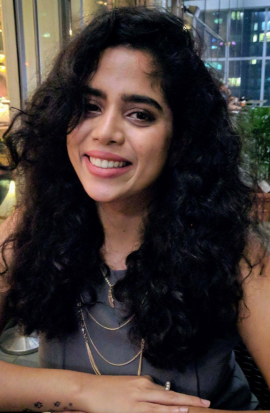
Mindfulness
“If you are depressed you are living in the past. If you are anxious you are living in the future. If you are at peace you are living in the present.” Lao Tzu.
As Lao Tzu expresses so elegantly, mindfulness is about living and enjoying the present moment. Jon Kabat-Zinn, the founder of the clinically used and scientifically proven Mindfulness-based stress reduction course (MBSR), defines mindfulness as “Awareness that arises through paying attention, on purpose, in the present moment, non-judgmentally.” He has written several books about mindfulness, the most famous is Full Catastrophe Living. But more importantly, he and his colleagues started scientifically studying the effect of mindfulness on the human brain and mental and physical health. Mindfulness is clinically used for stress reduction, treatment of posttraumatic disorders, depression, or addictions.
Nowadays there are many more studies about the positive effects of mindfulness. I can list:
- Better concentration and memory
- Burn-out prevention
- Increased satisfaction and happiness
- Better sleep
- Better mental and physical health
- Better immune system
- Pain reduction
- Control eating disorders
- Increase emphatic, altruistic and prosocial behavior
- Increase creativity
At the same time, I want to emphasize, it is not a miracle or cure for everything, as the message of many headlines suggest. Mindfulness is a long-term practice. It takes time and patience to see positive effects. However, I highly recommend experiencing it yourself.
You can find many books, articles or lectures about mindfulness and how to practice. You can also use apps like Headspace, Calm, Simple Habit or Insight Timer. However, mindfulness is not just about sitting still during formal practices. Mindfulness is also about living in the present moment and incorporating mindfulness into all daily activities. It means paying attention and fully enjoying your morning coffee, eating your lunch without disruption and really experiencing the taste, or just carefully listening during the conversations with your partner or colleagues. At the same time, you can use waiting at the bus stop or in line at the grocery shop to stop for a moment and really focus on yourself, your feelings and thoughts, your emotions, or your breath. You will maybe realize you are exhausted or a little bit sick, and thus you can slow down, take vitamins, and prevent a bigger illness.
Mindfulness is a practice. I love the analogy that mindfulness is a mental gym. You can catch the bus even without regular running, but you probably will be out of breath longer. The same works for mindfulness. You can cope with stress, however, with mindfulness it can be easier. Explore and try different mindfulness techniques. Everybody is different and has different needs and preference. It is worthy to try and find your own way.
written by Pavla Hubalkova
References
J. Brewer (2017): The Craving Mind: From Cigarettes to Smartphones to Love – Why We Get Hooked and How We Can Break Bad Habits. Yale University Press.
Chiesa et al. (2011): Does mindfulness training improve cognitive abilities? A systematic review of neuropsychological findings. Clin Psychol Rev, 31(3):449-64.
Goldberg et al. (2018): Mindfulness-based interventions for psychiatric disorders: A systematic review and meta-analysis. Clin Psychol Rev, 59:52-60.
Gu et al. (2015): How do mindfulness-based cognitive therapy and mindfulness-based stress reduction improve mental health and wellbeing? A systematic review and meta-analysis of mediation studies.Clin Psychol Rev, 37:1-12.
Hölzel et al. (2011): Mindfulness practice leads to increases in regional brain gray matter density. Psychiatry Res. 191(1): 36–43.
Kabat-Zinn (1991): Full Catastrophe Living. Delacorte press.
Khoury et al. (2015): Mindfulness-based stress reduction for healthy individuals: A meta-analysis. J Psychosom Res, 78(6):519-28.
Mason et al. (2018): Testing a mobile mindful eating intervention targeting craving-related eating: feasibility and proof of concept. J Behav Med, 41:160–173.
Tang et al. (2015): The neuroscience of mindfulness meditation. Nature Reviews Neuroscience, 16(4), 213-225.
YounJue (Eunice) Bae
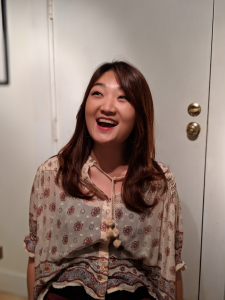
I am Eunice and I am a chemistry PhD student in the Wasielewski group at Northwestern University. I am originally from South Korea. I got my bachelor’s degree in chemistry at University of California, Berkeley where I found my passion in both teaching and research. After working in multiple groups for three years, I found that I am really interested in spectroscopy. Here at Northwestern University, I study a unique photochemical process in organic chromophores called singlet fission using various time-resolved spectroscopies including transient absorption, and electron paramagnetic resonance spectroscopy. My project goal is to understand the mechanistic picture in singlet fission and my recent work in Journal of the American Chemical Society, highlights how the packing structure in solid state changes singlet fission dynamics. I am also deeply interested in teaching and have produced short videos to connect chemistry concept taught in general chemistry class to the cutting-edge research done at Northwestern university. My long-term goal is to become a tenure-track faculty where I can pursue both of my interest in research and teaching. I really enjoyed my time at Chicago Women in STEM Initiative symposium and plan to attend future meetings. It feels good to be part of this community where everyone is supportive, and I hope we can continue to work together and foster greater number of women in STEM!
Multicultural dialogues
“Intersectionality in STEM: Analysis. Action.” This was the topic of one of our STEM circuit meetings. By definition, intersectionality is the theory that the overlap of various social identities, e.g. race, gender, sexuality, and class, contributes to the specific type of systemic oppression and discrimination experienced by an individual. Our speaker Sekile M. Nzinga-Johnson, Ph.D., MSW, director of the Women´s Center at Northwestern University, shared with us many inspiring perspectives and personal experiences.
She started with a quote from Audre Lorde: “There is no such thing as a single-issue struggle because we do not live single-issue lives”, describing how intersectionality is an extremely complex issue with many variables and consequences. Everybody has different backgrounds, experiences, and expectations. She emphasized the importance of looking around and asking questions like “Who is not in this room? Who is suffering the most? Am I surrounded by diversity as much as possible? Am I listening to other voices?” She also shared with us her other favorite quote by Audre Lorde “You do not have to be me in order for us to fight alongside each other.” to stress that we have to support and care about things that are not personally related to us. I personally liked her advice that we have to center ourselves. Take care of yourself first! You can help others only when you have enough energy. Sometimes you have to prioritize yourself and just survive the hard part of your life and that is okay; you can help and support others later.
The whole topic deeply resonates with me. I am originally from the Czech Republic and thanks to my Fulbright internship I have spent almost one year in the USA in a heterogenous multicultural environment. I have experienced different cultures and cultural events, educational systems, working environments, health systems, etc. I celebrated traditional American Thanksgiving, Czech Christmas with international friends, Chinese New Year, and a Jewish Seder. A few weeks ago, I, a white European from the Czech Republic, was the “minority” at the Fulbright Enrichment Seminar where I met 80 Fulbrighters from 51 different countries. And it was absolutely amazing.
Another very strong experience was attending The Multicultural Dialogue Group at Northwestern University. It is an initiative by the Graduate International Students Association to connect students, postdoctoral trainees, visiting scholars, and others from various backgrounds with one another, and to create opportunities for meaningful conversations on different topics including cultural differences, self-identity, relationships, prejudices, religions, arts, and more. Every meeting has a specific topic and the discussion is peer-moderated. Everybody has the opportunity to share own experiences or opinions. During the first meeting, I was nicely “shocked” how these conversations are deep, honest, and personal. I have learned so much and I am much more aware to avoid cultural stigma or biases.
I wish everybody has these experiences and everybody is open to listening and understanding of different voices. We are the same, we share the common life goals like being happy and healthy. Our only differences are our different personalities and life experiences.
written by Pavla Hubalkova
Carolyn E. Ramirez
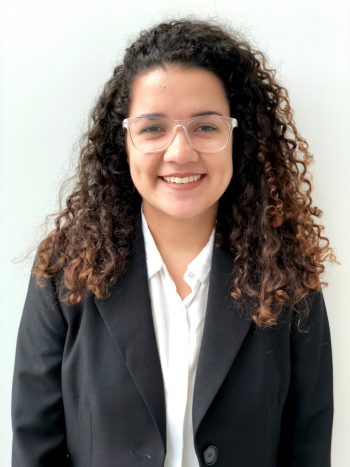
I am a second year Chemical Engineering PhD student at Northwestern University. My research in the Wasielewski group in the Chemistry Department focuses on synthesizing and characterizing organic chromophores and exploring their use in organic photovoltaic devices.
My path to graduate school began when I took my first chemistry class in high school and realized I had found my passion. I had an incredibly supportive teacher who encouraged me to explore chemical engineering as a career and recommended I apply for the National Youth Science Camp (link), a month long summer camp for high school graduates entering STEM (which I highly recommend). My high school chemistry teacher was my first true female mentor in science who strongly encouraged me to work towards a STEM degree. She showed me how important female mentorship and representation would be for the rest of my career. I had my first research experience at Rice University when I was a senior in high school, working with Dr. Daniel Hashim in Prof. Pulickel Ajayan’s lab studying three-dimensional carbon nanotube structures. I then worked in Prof. Brian Korgel’s lab during my undergraduate at the University of Texas at Austin studying two-dimensional silicon materials as well as Perovskite solar cells.
Throughout my undergraduate career, I never had any female mentors, let alone a fellow Latina mentor. I rarely had a female professor. It wasn’t until graduate school when that truly became apparent to me since the disparity in gender and racial diversity is severely heightened at the graduate level. The Chicago Women in STEM Initiative is an exciting turn to this experience. There are far too few women in my field to seek out natural mentorship, but I have already met so many great women from different universities and programs through this network. As a community, we can share our experiences and lift each other up knowing we are not going through this alone!
How to keep and nurture your mental health in academia
Doing research is mentally challenging. Scientists have to cope with many failures, frustrations, and uncertainties. In addition, the highly competitive academic environment, constant evaluations, and grant deadlines are not helpful. Mental health problems in academia are more common than many scientists want to admit. Here, I want to share a few scientifically-proven tips on how to keep and nurture your mental health.
Take a break
You can´t do big discoveries without clear thinking, so take a break and refresh your mind regularly. Set your work-hours 9-5 and then leave the lab or office and enjoy the life outside the lab. The results are not about how many hours you spend working on it. It is more about the quality and productivity of your work.
Follow your biorhythm
The biggest advantage of academia is that it usually allows flexible work hours. Listen to your body and follow your biorhythm. Start early if you are an early bird or come after lunch if your inner night owl is most productive at 2 am. Also schedule your activities using the same principle, e.g. maybe your best time for writing is the early morning when your mind is fresh, after lunch you prefer to stay active doing experiments, and in the evening you only have energy to analyze data. Everybody is unique and thus follow your own pattern.
Have hobbies
Science is not enough for a happy life. Keep your hobbies and do them regularly. It is a great way to relax your brain and think outside the box. You have probably heard about some of the biggest discoveries being made in the shower, during long road trips, jogging or playing with children.
Socialize
It is scientifically proved that rich social interactions and being part of communities are linked to longevity, a happier life, and good mental health. Of course, everybody is different and prefers various intensity and frequency. And thus, find your own best social interactions with your partner, family, friends, and/or colleagues. When you move to a new city, step out of your comfort zone and explore the new social groups. Check the internet, you will definitely find many opportunities.
Stay physically active
Good physical health is directly linked to mental health, but don’t panic! You do not have to start weight lifting or running marathons. Find your favorite physical activity. It can be walking, jogging, work out in the gym, playing basketball with your friends or attending an online yoga class. If you think you do not have time, think twice! You can always involve more physical activity during your normal daily life – take the stairs, walk during long calls or go for a stroll with your friends instead of sitting in cafes.
Eat and sleep well
This is absolutely basic and you have heard it so many times. However, it is essential. A good whole-food diet and enough high-quality sleep are the best medicine. And good news, you do not need special and expensive supplements for boosting your energy or feeling better. Changing your daily habits are often enough. And again physical wellbeing also keeps you mentally healthy!
Written by Pavla Hubalkova
Anna Marisa Di Staulo
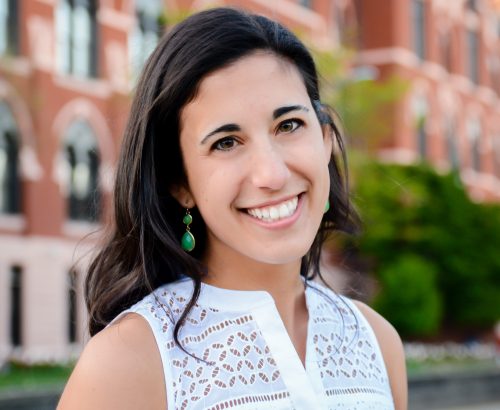
Greetings. I am a Research Technician in the Department of Physiology here at Northwestern University. I graduated from Saint Louis University (SLU) in 2015 with my B.S. in Exercise Science. Following graduation, I worked in a patellofemoral pain 3-D motion capture laboratory at SLU before beginning a clinical trial coordinator position at Washington University in St. Louis in breast oncology. This past summer I moved to Chicago and began working in the Disterhoft laboratory at Northwestern University Feinberg School of Medicine. Our lab investigates the neurobiology associated with memory and aging. I am excited to begin my PhD at the University of Illinois at Chicago this fall. My professional goal is to earn a PhD in the Biomedical Sciences with a focus in regenerative medicine. However, I didn’t always know that I wanted to pursue a PhD. It took pursuing a different career path and working in various research settings to help me realize my career goals. I may have taken the long road to get where I am today but I am thankful for the lessons I learned along the way. Overall, I believe in the importance of pursuing a career that you are passionate about. I want to feel challenged and inspired by my work. It may seem intimidating at first to make this change but it is so rewarding in the end.
As a part of the Chicago Women in STEM Initiative I am excited for the opportunity to meet other women in the STEM fields and to become a part of a community. I hope to one day be able to serve as a mentor to young women pursuing a career in the sciences.


